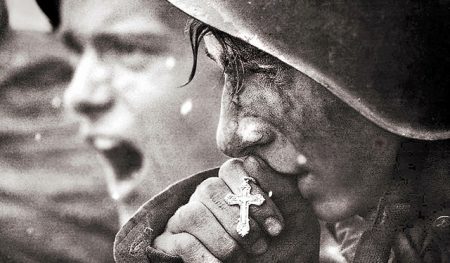Then the LORD said to Joshua, “Today I have rolled away the reproach of Egypt from you.” So the place has been called Gilgal to this day. On the evening of the fourteenth day of the month, while camped at Gilgal on the plains of Jericho, the Israelites celebrated the Passover. The day after the Passover, that very day, they ate some of the produce of the land: unleavened bread and roasted grain. The manna stopped the day after they ate this food from the land; there was no longer any manna for the Israelites, but that year they ate of the produce of Canaan. Now when Joshua was near Jericho, he looked up and saw a man standing in front of him with a drawn sword in his hand. Joshua went up to him and asked, “Are you for us or for our enemies?” “Neither,” he replied, “but as commander of the army of the LORD I have now come.” Then Joshua fell facedown to the ground in reverence, and asked him, “What message does my Lord have for his servant?” The commander of the LORD’s army replied, “Take off your sandals, for the place where you are standing is holy.” And Joshua did so.
Joshua 5:9-15
Combatants in war always desire, and often assume, divine help. Whether pagan or Christian, warriors seem to understand that in battle a myriad of external factors are out of their control. An assurance of divine help and favor inspires confidence in combat.
The renown of God’s mighty acts preceded the Israelites. Foreign kings lost the courage to face them. Protected behind the massive walls of stone, the city of Jericho was under a self-imposed siege as a result of the Israelites. The detailed battle strategy of God, however, did little to help the strength of the fighting men. With the doubting generation now dead, the younger men had failed to be circumcised. Immediately before the battle of Jericho, God commanded that the surgical procedure take place.
Such a strategy weakened the Israelite army but actually strengthened God’s plan of attack. At the time of the Passover, an appearance of God took place between Joshua and another man identified as the “commander of the army of the LORD” (v. 14). This man held the “sword of the Lord” and stood outside the walls of Jericho. When asked by Joshua where his loyalties lay, the man replied that he was neither for Joshua’s enemies nor the Israelites.
This response underscores the absolute sovereignty of God in matters of earthly loyalty in war. While God had indeed chosen to fight for the Israelites and against the Amorites, the ultimate conquest was not under the direct command of Joshua. The commander of the Lord’s army (seen by many as a pre-incarnate vision of Christ) appeared to Joshua to state unequivocally that the battle was the Lord’s. The Israelites simply were the instrument through which He would act for His own historical/redemptive purposes.
Church leaders should be quick to realize that God is ultimately ruling all nations. Because not all cultures and causes are equal before God, any nation who attacks another nation, even in retaliation, for acts of injustice should proceed thoughtfully and carefully. Care must be taken by the Church not to ascribe to God a particular side in war. Perhaps the best preparation for war is humility before the holiness of God by a self-examination of one’s sinful heart.





